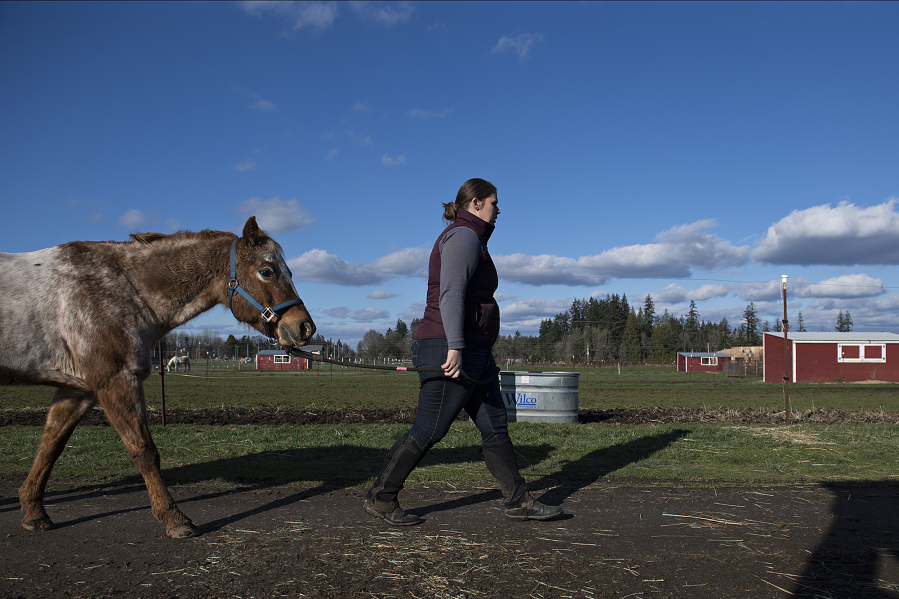Depending on the type of business, COVID-19 may have had a devastating blow or an unexpected boon.
For Silver Buckle Ranch, a horse riding and boarding nonprofit organization in Brush Prairie, it has been a boon.
“Honestly, we are doing better, and I am busier than I have ever been,” said Kassandra Bullcreek, ranch manager. “It’s not your typical pandemic story. There is such a demand; I have a waitlist. I can’t meet the need of the amount of people who want to come to the ranch right now.”
Bullcreek, 25, suspects that it’s because it’s one of a handful of activities that people view as being safe, since horse riding is primarily an outdoor activity that doesn’t require being close to others. The organization has still had to adjust, however.
“We do less large group lessons and everyone wears masks — except the horses,” said Peggy Neikirk, president of Silver Buckle Ranch. “But since we are in the fresh air, it helps keep the kiddos sane during these stay-at-home days.”
Silver Buckle Ranch is split into two parts, with one half of the organization being a nonprofit dedicated to programming and horse-riding lessons mainly for children and young adults. The other side is boarding, in which private residents use the facility to keep their animals, as well as ride them, if they don’t have the land. It’s a large part of the organization’s income.
The Columbian caught up with Bullcreek, who commutes to her job from Yacolt, to learn more.
Tell me about yourself.
I’m originally from the Phoenix, Ariz., area. I’ve always been working with animals, whether it’s at a veterinarian office or breeding horses. I have a long history at a therapeutic riding center in Phoenix. I volunteered there as a kid and got certified to teach. We came up to the Vancouver and Portland area for my husband’s job when he finished school. I was pregnant at the time, and I basically missed horses. It had been a while; I told my husband I wanted to be a stay-at-home mom but that I was bored. I started out as an instructor at nine months pregnant giving riding lessons. I instruct as well as manage private boarder and nonprofit programs at the ranch. The first-ever lesson I taught was April 2019. I moved to the Pacific Northwest in November 2018. So six months without horses was very difficult, clearly.
What drew you to working with horses?
You know how you hear about the crazy horse girl in every kid’s elementary school class? That was me growing up. I didn’t actually grow up with horses, but I heard about my grandma who had horses. They’re captivating animals. What I love about them, where a dog will give you unconditional love no matter what you do, you have to earn it with horses. What you give to horses in terms of your emotions and how you handle them, they will give it right back. They are mirrors for our behavior. I did some camps when I was younger. I didn’t start to get hands-on involved until I was 16 and old enough to volunteer at a therapeutic riding center in Phoenix. It grew into an obsession from there. It’s always found its way back into my life, and I’ve finally just accepted it’s going to be here to stay.
You mentioned that you didn’t have horses growing up. Does it tend to be an activity for people with the means to do it?
It tends to be. Horseback riding is definitely something you have to have the money to pay for it. It’s not cheap. One goal we have at the ranch: we don’t charge crazy prices for riding lessons. We want to reach more lower-income families that couldn’t afford riding at other places.
What are some of the challenges of your job?
The challenge of the job is that it never stops. Horses and animals in general never have convenient timing. I’m lucky to have a husband who embraces what I do. I’m not a typical stay-at-home, keep-the-house clean wife; I don’t work a typical 9-to-5, there’s been several nights I’ve been on the ranch with a horse or a goat until 10 o’clock at night. It’s just the predictability is difficult, but that’s what I love about the job — it’s never the same thing.
WORKING IN CLARK COUNTY
Working in Clark County, a brief profile of interesting Clark County business owners or a worker in the public, private, or nonprofit sector. Send ideas to Hope Martinez:
hope.martinez@columbian.com; fax 360-735-4598; phone 360-735-4550.




